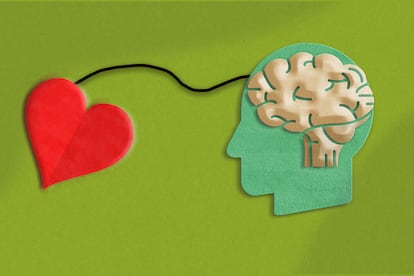Is there sex life in the midst of depression or anxiety?
Psychiatric disorders and their treatments can impact couple relationships and intimacy, but experts say there are ways of overcoming the negative side effects of medication

“It is no measure of health to be well adjusted to a profoundly sick society,” said Jiddu Krishnamurti (1895-1986), thinker, teacher, philosopher and lecturer. A gregarious nature drives humans to live in a community and seek the recognition of their peers. Conflict appears when the individual notices that in order to be accepted by society and to obtain the benefits of said adaptation (material goods, family, partner, fame and prestige) they must do things that may go against their health, their own worldview and their principles.
“In recent years we are witnessing a high increase in what I call adjustment disorders, such as depression and anxiety,” says José Antonio López, a psychiatrist and former vice president of the Spanish Association of Private Psychiatry. “They are also known as minor psychiatric disorders, but I prefer to call them adjustment disorders because they are derived from society and the lifestyle in which we are immersed.”
The sex life of a person who suffers from these mental disorders and who has to take medication is not only hindered by the disease itself, but also by the treatment. “All selective serotonin reuptake inhibitors [SSRIs] decrease desire, and those that don’t affect serotonin [there are two or three] are not as effective,” says López. “So you enter a vicious circle, because sexuality is already affected by these disorders and, by wanting to cure them, desire is suppressed. Thus, these patients are deprived of their sexual dimension, which could help them improve their mood.”
Despite the fact that science is advancing and there are constantly new discoveries, there has not been much to celebrate in matters of psychiatry. “There is no research into new drugs or remedies to treat these conditions with fewer side effects. Right now, pharmaceutical companies seem more interested in cardiology and endocrinology, but not in mental illnesses,” explains the psychiatrist.
Drug-free weekends
According to López, “the most frequent request when you prescribe SSRIs is, if the patient is a man: ‘Please, don’t decrease my libido,’ and if it’s a woman: ‘Don’t let me get fat.’ Psychiatrists have a serious problem with this, because there are not many options, and treating these disorders can go on for years. Sometimes men are prescribed Cialis, a drug that promotes erections; but there is nothing for the women, although it is also true that female sexuality and desire are very complex factors. One time, years ago, I ran into a psychiatry guru at an event and asked him what solution he saw to this problem. He replied: ‘Drug-free weekends. It’s the only possible solution.’ Today, many people skip their medication for up to 48 hours on the weekend in order to suffer less from its adverse effects and to be able to recover a bit of their sex life. It doesn’t always work, and I’m not very supportive of this, but many people are already doing it and resuming their routine on Monday.”
Bipolar disorder – the topic of a memorable episode of the series Modern Love, starring Anne Hathaway – is also on the rise. However, as López points out, “we must not confuse bipolarity, which has a very important genetic component and is very easy to diagnose (with its alternating depressive and euphoric phases), with an unstable personality, as they are different things. Mood stabilizers are prescribed to treat bipolarity, which affect libido less.”

Mental disorders can improve a lot with some type of therapy that helps to understand the situation; in mild cases, they can even be solved without medication. But not everyone can afford a psychologist or a psychiatrist. As a consequence, the vast majority anesthetize their anxiety with antidepressants or anxiolytics, and suffer the side effects.
Binge-eating disorder
Food has gone from being our fuel to fulfilling other functions: it can be a gratifying element, a source of pleasure available just by opening the fridge, replacing love or affection and acting as an instant anxiolytic.
“Eating disorders have increased, and women represent 80% of the people who suffer from them,” says Susana Rodríguez, a psychologist specializing in eating disorders who works at the Susana RodVar Integral Psychology Center in Seville, Spain. Anorexia, bigorexia and bulimia, the most common eating disorders, are now joined by a new one: binge-eating. “Binge eating disorder is an uncontrolled urge to eat everything, which only ends when there is no more food. Unlike bulimic binges, there are no compensatory behaviors, no feelings of guilt, and people can do it several times a day,” explains Rodríguez.

The treatment of eating disorders must be multidisciplinary because there are many areas to address, including sexuality. This is why Rodríguez works with sexologists. “All these disorders have something in common, which is body dissatisfaction,” points out the psychologist. “Anorexic people hide their bodies and avoid sexual contact. In fact, we have patients in their 50s who are still virgins. There is a lack of desire and excessive control, and in men, a difficulty in maintaining an erection. On the other hand, the bulimics present a compulsive sexuality, although a pleasureless one, because they feel bad afterwards. But having intercourse makes them feel valuable. In those who suffer from bigorexia, taking anabolic steroids has a very negative influence on the sexual field.”
What to do if medication hinders a relationship
People with depression do not usually think about their sex life. The same goes for the health professionals, who push it to the bottom of the list. “Thinking about it is frowned upon, and people avoid talking about it,” says Antonio Daniel García Rojas, psychologist, sexologist, director of the department of pedagogy of the University of Huelva and member of the Spanish Federation of Sexology Societies. “For this reason, the first thing to do – from the point of view of sexology – is to improve communication between the couple. That the person who suffers from depression or anxiety expresses their situation, their fears, the effects of the treatment, because it is important to put it into words what they are going through and feel understood.”
Since sexual performance is not the same, partly due to medication, it may be tempting to forgo sexuality, but that is the worst thing to do. “What we propose is to carry out other types of practices apart from coitus. Sexuality where the affected person plays a more passive role and focuses more on sensuality, on feeling, rather than on doing. To explore new stimuli, spaces, games, massages, and try to discover the button that activates desire,” explains García Rojas. Sometimes, desire can fade. Rather than wait for it to return, we can look for it; in the end we will find it.
Tu suscripción se está usando en otro dispositivo
¿Quieres añadir otro usuario a tu suscripción?
Si continúas leyendo en este dispositivo, no se podrá leer en el otro.
FlechaTu suscripción se está usando en otro dispositivo y solo puedes acceder a EL PAÍS desde un dispositivo a la vez.
Si quieres compartir tu cuenta, cambia tu suscripción a la modalidad Premium, así podrás añadir otro usuario. Cada uno accederá con su propia cuenta de email, lo que os permitirá personalizar vuestra experiencia en EL PAÍS.
¿Tienes una suscripción de empresa? Accede aquí para contratar más cuentas.
En el caso de no saber quién está usando tu cuenta, te recomendamos cambiar tu contraseña aquí.
Si decides continuar compartiendo tu cuenta, este mensaje se mostrará en tu dispositivo y en el de la otra persona que está usando tu cuenta de forma indefinida, afectando a tu experiencia de lectura. Puedes consultar aquí los términos y condiciones de la suscripción digital.









































